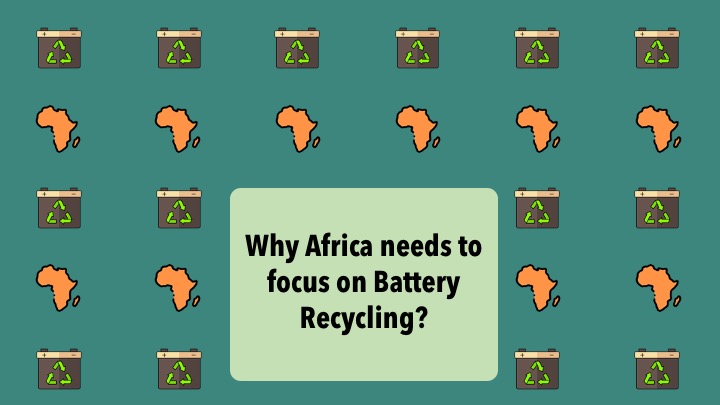
Why Africa needs to focus on Battery Recycling?
In Africa itis estimated that stationary battery capacity could grow by 22% annually through 2030 due to demand from energy access applications, and mini grids alone could represent 40% of the 2030 market. Market forecasts by the World Economic Forum show that as more Africans gain access to energy over the coming years, the demand for batteries will grow to 83 GWh by 2030.
While there is a growing demand for batteries in Africa, currently it has very little capacity to produce or recycle batteries and is not as well-established as in other parts of the world. This appears to be a huge opportunity for the continent to take control of its destiny by investing in developing these capabilities and reducing reliance on foreign imports. This has the added benefit of creating local jobs and elevating the continent’s economic productivity. Additionally, battery recycling is also an important way to reduce the environmental impacts of battery production and disposal, as well as to conserve resources.
However, there are several challenges to establishing a robust battery recycling industry in Africa. Some of the main challenges include:

Despite these challenges, there are a number of efforts underway to improve battery recycling in Africa. For example, the Africa Battery Alliance is a partnership between the African Union and the International Renewable Energy Agency (IRENA) that aims to accelerate the development of a sustainable battery value chain in Africa. This includes efforts to promote battery recycling as well as to increase the use of renewable energy storage systems.
Other organizations, such as the African Battery Recycling Association, are working to raise awareness about the importance of battery recycling and to establish best practices for battery collection and recycling in Africa.
Overall, while battery recycling in Africa is still in the early stages of development, there are a number of efforts underway to improve the situation and reduce the environmental impacts of battery production and disposal.
Factors influencing future of battery recycling in Africa
One of the key factors that will influence the future of battery recycling in Africa is the increasing demand for batteries in the region. As the adoption of electric vehicles, renewable energy systems, and other battery-powered technologies continues to grow in Africa, there will be a need for more batteries to meet this demand. This could create new opportunities for battery recycling in the region.
Another factor that could influence the battery recycling in Africa is the development of new technologies and business models. As battery technology continues to evolve, it is likely that new approaches to battery recycling will emerge, which could make it more economically viable to collect and refurbish used batteries in Africa.
The future of battery recycling in Africa will also be influenced by regulatory and policy developments. Governments in the region will have a role to play in establishing frameworks and incentives that support the collection, treatment, and recycling of used batteries, and in promoting the use of recycled batteries in various applications (Distributed Renewable Energy(DRE) applications like solar fridges)
All in all, the future of battery recycling in Africa is likely to be shaped by a combination of economic, technological, and regulatory factors. As these factors evolve, it is likely that battery recycle will become an increasingly important aspect of the region’s efforts to manage its e-waste and reduce its environmental impact.


